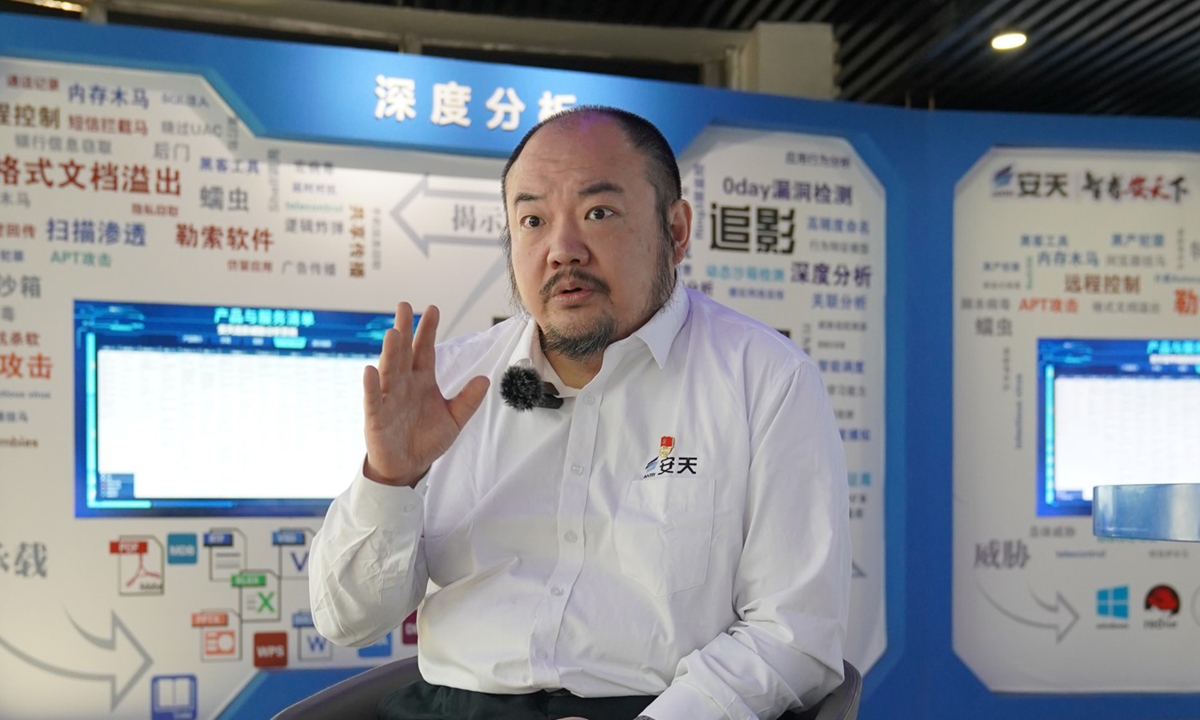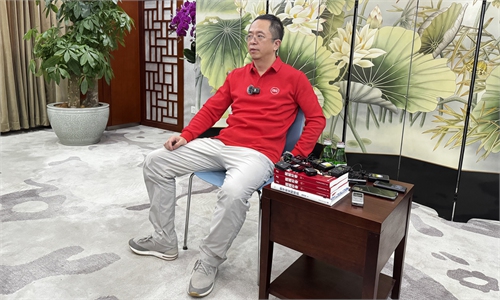IN-DEPTH / IN-DEPTH
Accelerating development of industrial systems is highest priority for AI industry in China: top political advisor

A concept photo of cybersecurity Photo: VCG

Xiao xinguang
"The highest priority for the development of artificial intelligence (AI) technologies in China is not to create explosive applications, but to accelerate the development of industrial systems and the real economy," said Xiao Xinguang, a member of the National Committee of the Chinese People's Political Consultative Conference and chief software architect from Chinese cybersecurity company Antiy.
With the emergence of ChatGPT and Sora, the AI industry is accelerating its development, and human society is accelerating into the era of AI civilization. At the same time, the potential problems and uncertainties related to it may bring negative impacts and challenges to humanity. The security issues arising from it have also been put on the agenda.
"AI's extensive and deep empowerment in all industries and social fields is an inevitable trend in history. For the entire economic and social fields, there is only a difference between fast and slow, but no choice of whether to use it or not. Embracing AI may not necessarily mean success for various industries, but not embracing AI will definitely lead to elimination," Xiao told the Global Times.
Embracing AI requires a more open and collaborative mindset, said Xiao, noting that different departments have different focuses.
For example, the industrial sector needs to quickly follow up and apply AI to accelerate digitalization, intelligent upgrading, and transformation; however, government agencies should focus on how to better serve the people with AI, accelerate economic and social development, and also do well in risk control.
The field of cybersecurity, on the other hand, focuses on three major risks: the risks of AI technologies such as algorithms and data; application risks of platforms such as data leakage; and the risks of upgrading network attack capabilities under AI empowerment, Xiao said.
As a member of the national cybersecurity agency, Xiao described how he and his colleagues encounter cases of "AI-enhanced network attacks" in their daily work. "The graphic and textual content of phishing emails from some overseas attack organizations in the past two years are clearly generated by large model platforms. In cybercrime cases, deepfake technology has been frequently used."
According to Xiao, AI significantly empowers the entire attack chain. This includes, but is not limited to, efficiently exploiting software and hardware vulnerabilities and enhancing the organization of information intelligence. It also improves the exploration of attack entry points, the orchestration and automatic launching of attacks, and the writing of attack viruses. Additionally, AI enhances the ability to create highly targeted social engineering dialogues, deceiving network administrators and users, among other capabilities.
"We must pay attention to the challenges of content generation and deepfake for cognitive confrontation, and we must also conduct in-depth analysis and research on the deep empowerment of AI throughout the network attack process," Xiao said.
A thief crying "Stop thief"
The US has been the first to associate AI technology with the so-called "Chinese hackers" launching attacks on the US. In January, the FBI and US Justice Department used a court order to address vulnerabilities in thousands of internet-connected devices that are at the center of a so-called Chinese hacking campaign targeting sensitive US critical infrastructure, CNN reported.
In response, Xiao said the US continues to conduct network intrusions and intelligence activities in cyberspace to support its global hegemony system. By using its own behavior paradigm to judge others, the US was trying to shift its attack activities to China in order to muddy the waters in international diplomacy and public opinion.
The US reportedly has the most powerful global network attack engineering system, complete and continuously iterated network attack weapons and equipment, and the largest team of network attack personnel. Since the birth of the internet, the most long-term, covert, and severe network attacks and eavesdropping activities, such as Stuxnet, Flame, and Duqu, have all been initiated by the US.
"We have analyzed and disclosed the network attack activities of the US against other countries many times, including a detailed analysis and reconstruction of the attack process of the largest SWIFT service provider in the Middle East, EastNets, as well as a detailed exposure last year of the operation mechanism of the US attacking key personnel's phones and computers based on the 'quantum' system," Xiao said.
US intelligence agencies have long been concerned about the strengthening of AI capabilities in network attacks and the use of deepfake technology. It is necessary to pay close attention to the shaping of the US attack capabilities by super large model platforms, he noted.
Different paths
While smearing China for using AI technology for hacking attacks, the US is also actively downplaying China's AI technology development. In a report by CNBC on January 9, FBI Director Christopher Wray was quoted as saying "18 of the 20 most successful AI companies in the world are American." He then turned his focus to China, claiming that "You can bet your bottom dollar that foreign adversaries, especially the Chinese, are actively targeting that innovation, that intellectual property."
Xiao said that due to historical advantages and geopolitical factors, as well as long-term global dividends, the US has established a leading position in the global technology and industry. In order to solidify this leading advantage, the US government and capital groups have formed an inertia to suppress followers, especially by creating a false perception: "Whenever other countries show certain advantages in some fields, it must be the result of stealing American achievements." This is an extremely arrogant and deceptive rhetoric, Xiao said.
China's academic achievements in AI technologies have surged in recent years, with the number of top AI scholars ranking second globally. Universities and industries such as Tsinghua University and Harbin Institute of Technology have published high-level academic achievements in various subfields of AI. At the same time, scientific and technological development from basic theory to engineering implementation and application often follows a "convergence" path, so there will be a certain similarity in the basic path of technological innovation. Respecting the contributions of pioneers does not mean accepting that the first to develop can permanently monopolize, Xiao explained.
"The US has obtained more global dividends, gathered top talent resources worldwide, and naturally established a first-mover advantage in many fields; however, countries with strong self-development intentions, such as China, will also determine key development areas based on their own characteristics, relying on effective government organization, benign competition in the industry, and the diligence and unity of the people to make progress," Xiao stressed.
This cybersecurity expert believes China and the US will have certain differences in the development path of AI technologies. Information technology is the US' advantageous field, and through large-scale capital investment, it has established a large-scale intensive innovation model based on information complexes, forming a new strategic competitive capability. This system operates similarly to OpenAI+ChatGPT. The related experience is highly worthy of reference but difficult to completely imitate.
Currently, China has experienced a phenomenon of "one factory one model, a thousand-model battle with each other" in the development of general large models, which has brought about some resource waste and ineffective investment, affecting the aggregation of production factors. However, we should not be overly anxious. We are one of the few countries with all the elements to build a super large-scale general artificial intelligence platform. Our "formation" will be optimized and adjusted as we develop, Xiao said.
He noted that, at the same time, China has the most complete industrial system and a very solid foundation in the real economy. There is still a lot of room for improvement in automation, unmanned operation and intelligence. Our real industries cannot wait for the maturity of super large-scale general model platforms but must quickly gain AI empowerment and then iterate and improve. Therefore, the focus of China's AI development is still to accelerate the transition of the industrial system to new quality productivity and gain more benefits in the real industry.

AI Photo: VCG
Industrial development the highest priority
On February 12, NVIDIA CEO Jensen Huang said at the World Government Summit in Dubai that every country needs to own the production of their own intelligence to codify its culture while utilizing its economic potential.
In response, Xiao said that the development model of AI is highly related to the national industrial characteristics.
In the context of the hollowing out of industry due to profit-driven capital within the US, relying on information giants, capital power and rapid aggregation of talent, the best choice for the US is to establish a large-scale intensive innovation model in the field of large model platforms to form a new strategic competitive capability. On the other hand, China's overall industrial scale, completeness of the industrial system, and substantial real economy are globally leading. We have rich AI integration points and potential points in the industry and real economy, providing ample space for local innovation, he said.
However, China also needs to move from a fragmented small production model to an intensive large production model for AI platform construction. The country should gradually guide the formation of a super-scale general AI platform in terms of high-quality data sources, large-scale computing infrastructure, operational ecology, and organizational methods, supporting the industrial ecosystem, which is important for developing new quality productivity and strengthening national strategic security capabilities, Xiao noted.
Xiao added that it is also significant for building a community with shared future in cyberspace. The US government's suppression of China's high-tech industry development through a "small yard and high fence" strategy and the use of the so-called "table and menu theory" to force other countries to take sides is evident.
Especially in the field of AI, it has used a series of measures such as talent bans, access restrictions and hardware bans. In terms of AI platforms and applications, it forces other countries to make choices, which will inevitably lead to a camp-style rift in the development of artificial intelligence technology, causing a major division. This makes it even more necessary for the development of China's AI technologies to have an internationalist perspective, according to Xiao.
The development of China's universal large-scale model platform can not only provide empowering assistance for the economic development of other countries, but also help third world countries build their own sovereign artificial intelligence infrastructure, helping them break free from dependence on Western countries in modernization development. Peace-loving and progressive countries should work together to bring a new digital infrastructure system to a more equal world, Xiao noted.
Facing the rapid development of AI technologies, reducing the risk of AI proliferation is a challenge facing all governments. By 2023, the US had already signed the first executive order on AI regulation, which requires "companies developing any foundation model that poses a serious risk to national security, national economic security, or national public health and safety must notify the federal government when training the model."
Due to the significant security risks and uncertainties of AI technology, strengthening the management and guidance of technological capabilities and platforms is an important function and responsibility of governments around the world, Xiao sated.
Chinese authorities have already formulated an interim regulation on the management of generative AI services. Currently, China has a certain foundation for the management mechanism of AI technologies and platforms, but it still needs continuous adjustment and improvement. "We need to achieve better, faster, and safer growth and development, and development itself is the greatest security," Xiao said.



